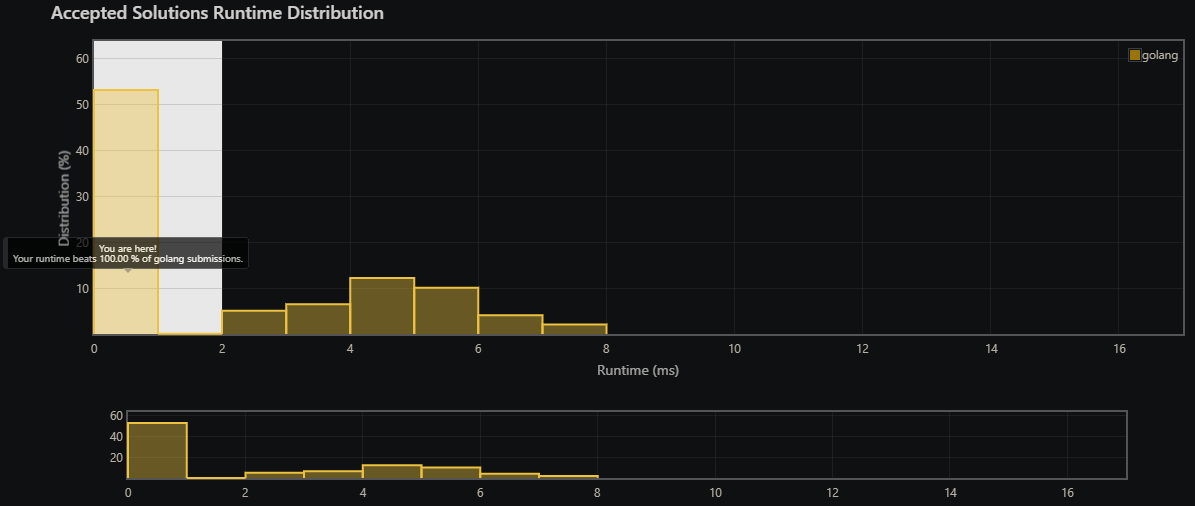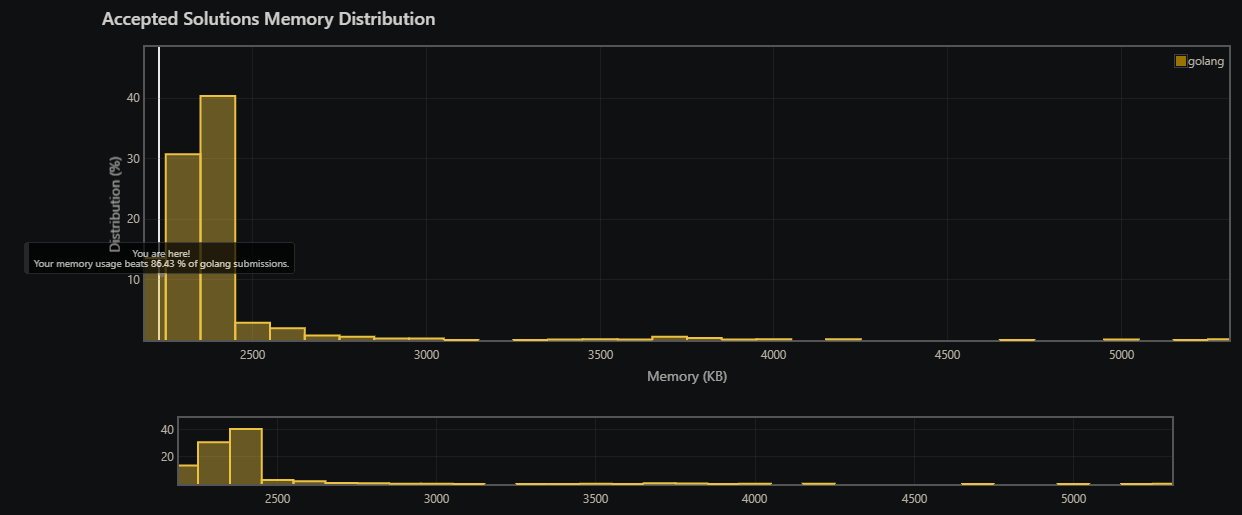고정 헤더 영역
상세 컨텐츠
본문



Write a function to find the longest common prefix string amongst an array of strings.
If there is no common prefix, return an empty string "".
Example 1:
Input: strs = ["flower","flow","flight"]
Output: "fl"
Example 2:
Input: strs = ["dog","racecar","car"]
Output: ""
Explanation: There is no common prefix among the input strings.
Constraints:
- 1 <= strs.length <= 200
- 0 <= strs[i].length <= 200
- strs[i] consists of only lower-case English letters.
My code
func longestCommonPrefix(strs []string) string {
shortest := 201
short := ""
longest := ""
buf := ""
for _, v := range strs {
if len(v) < shortest {
shortest = len(v)
short = v
}
}
for i := shortest; i > 0; i-- {
length := i
right := 0
for _, v := range strs {
temp := v
for j := 0; j < len(temp); j++ {
if j+length > len(temp) {
break
}
if temp[0:j+length] == short[0:i] {
right++
buf = short[0:i]
}
}
if right == len(strs) && len(longest) < len(buf) {
longest = buf
}
}
}
return longest
}- I declared shortest to allocate length of shortest string for using standard of prefix.
- This variable is 201 because maximum length of string is 200.
- Short will have shortest string.
- longest will have longest prefix after checking buf value.
- First for loop will find shortest string.
- Second for loop will be used for decreasing array length from right to left.
- Length will be used for it.
- Right value will have number of calling.
- For loop in the second for loop runs for calling strings which saved in slice.
- These stings will be allocated to temp for comparing with shortest string.
- Next for loop will be printing string as many words as the shortest word.
- First if condition will screen if printed string is beyond length with common words.
- when first if condition passes, original string and shortest string will be compared.
- If so right will increase and matched string will be allocated to buf.
- Last if condition will check whether every strings are matched with shortest prefix.
- Also buf which came from fomer if condition is longer than it, longest string will have lonager prefix.
sample 0 ms submission & sample 2300 KB submission
func longestCommonPrefix(strs []string) string {
m := 500
for _, s := range strs {
l := len(s)
if l < m {
m = l
}
}
prefix := ""
for i:=0; i<m ;i++ {
test := ""
for j, s := range strs {
if j==0 {
test = s[0:i+1]
continue
}
if test != s[0:i+1] {
test = ""
break
}
}
if test == "" {
break
}
prefix = test
}
return prefix
}- m will be 500 and have shortest length after for loop.
- prefix will be declared with ""
- i will increase from 0 to m.
- test variable is declared with "".
- When j index is 0, test will have string s[0:i+1].
- I think i can be 1 and condition same and less than m.
- Next if will compare test with next string [0:1+1].
- I think opposite code will be better.
- For example short length comparison from the saved shortest length to the end.
Modification
func longestCommonPrefix(strs []string) string {
shortest := 201
for _, v := range strs {
if len(v) < shortest {
shortest = len(v)
}
}
for i := shortest; i > 0; i-- {
temp := ""
for j, k := range strs {
if j == 0 {
temp = k[0:i]
}
if temp != k[0:i] {
break
}
if temp == k[0:i] && j == len(strs)-1 {
return temp
}
}
}
return ""
}sample 1 ms submission
func longestCommonPrefix(strs []string) (prefix string) {
minLen := math.MaxInt
for _, str := range strs {
minLen = min(minLen, len(str))
}
builder := strings.Builder{}
first := strs[0]
for i := 0; i < minLen; i++ {
char := first[i]
for _, str := range strs[1:] {
if str[i] != char {
return builder.String()
}
}
builder.WriteByte(char)
}
return builder.String()
}
func min(a, b int) int {
if a < b {
return a
}
return b
}sample 2 ms submission
func longestCommonPrefix(strs []string) string {
prefix := strs[0]
for i := 1; i < len(strs); i++ {
for j := 0; j < len(prefix); j++ {
if len(strs[i]) <= j || strs[i][j] != prefix[j] {
prefix = prefix[0:j]
break
}
}
}
return prefix
}sample 3 ms submission
func longestCommonPrefix(strs []string) string {
res := -1
for {
done := false
for i := 0; i < len(strs); i++ {
if res == len(strs[i]) - 1 {
done = true
break
}
if i > 0 && strs[i - 1][res + 1] != strs[i][res + 1] {
done = true
break
}
}
if done {
break
}
res++
}
if res == -1 {
return ""
}
return strs[0][:res + 1]
}sample 4 ms submission
func min(x, y int) int {
if x < y {
return x
}
return y
}
func commonPrefix(str1 string, str2 string) string {
prefix := ""
size := min(len(str1), len(str2))
for i:= 0; i < size; i++ {
if str1[i] != str2[i] {
break
}
prefix += string(str1[i])
}
return prefix
}
func longestCommonPrefix(strs []string) string {
if len(strs) == 0 {
return ""
}
prefix := strs[0]
for i:= 1; i < len(strs); i++ {
prefix = commonPrefix(prefix, strs[i])
}
return prefix
}sample 2200 KB submission
func longestCommonPrefix(strs []string) string {
if len(strs) == 1 {
return strs[0]
}
start, end := 0, len(strs[0])
for start < end {
flag := true
for i := 1; i < len(strs); i++ {
if start >= len(strs[i]) || strs[i][start] != strs[0][start] {
flag = false
break
}
}
if flag {
start++
} else {
break
}
}
return strs[0][:start]
}sample 2400 KB submission
func longestCommonPrefix(strs []string) string {
longestPrefix := ""
done := false
if len(strs) < 1 {
return ""
} else if len(strs) == 1 {
return strs[0]
}
for idx := 0; idx < len(strs[0]) && !done; idx++ {
currentChar := strs[0][idx]
for _, word := range strs {
if len(word) <= idx || word[idx] != currentChar {
done = true
break
}
}
if !done {
longestPrefix += string(currentChar)
}
}
return longestPrefix
}'Go > Leet Code' 카테고리의 다른 글
| [Go] Array and string - Reverse String (0) | 2022.04.09 |
|---|---|
| [GO] Array and string - Two-pointer Technique - Scenario I (0) | 2022.04.09 |
| [Go]Array and String - Implement strStr() (0) | 2022.04.04 |
| [Go] Array and string - Add binary (0) | 2022.04.03 |
| [Go] Array and string - Immutable String - Problems & Solutions (0) | 2022.04.02 |





댓글 영역